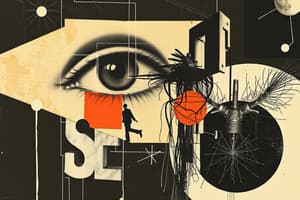Podcast
Questions and Answers
What is the primary focus of Information Literacy?
What is the primary focus of Information Literacy?
- Organizing information efficiently
- Communicating information effectively
- Evaluating information reliability
- Understanding information needs (correct)
In the context of finding information, what do 5W and 1H questions mainly address?
In the context of finding information, what do 5W and 1H questions mainly address?
- Where to store information
- How to evaluate information
- Why information is needed (correct)
- When to communicate information
Which source is typically NOT recommended as a reliable resource according to the text?
Which source is typically NOT recommended as a reliable resource according to the text?
- Popular magazines (correct)
- Trade publications
- Encyclopedia
- Scholarly journal
What technique is suggested for searching information effectively in EResources?
What technique is suggested for searching information effectively in EResources?
What should be analyzed to determine the reliability of a resource?
What should be analyzed to determine the reliability of a resource?
What concept does the text emphasize as essential for avoiding plagiarism?
What concept does the text emphasize as essential for avoiding plagiarism?
Which of the following statements about communication and shared meaning is NOT true?
Which of the following statements about communication and shared meaning is NOT true?
Which of the following statements about culture and language is correct?
Which of the following statements about culture and language is correct?
What is the primary ethical concern raised in the text regarding the creation of culture?
What is the primary ethical concern raised in the text regarding the creation of culture?
What is the significance of media convergence?
What is the significance of media convergence?
Which concept is described in the text regarding the dialogism of convergent media?
Which concept is described in the text regarding the dialogism of convergent media?
According to Spicheva's perspective mentioned in the text, what is the significance of the digital universe?
According to Spicheva's perspective mentioned in the text, what is the significance of the digital universe?
Flashcards are hidden until you start studying
Study Notes
Information Literacy
- Information literacy is the ability to find, evaluate, organize, use, and communicate information in all its various formats.
- IL skills include identifying knowing, understanding, and information needs.
- 5W and 1H questions help in identifying information needs:
- Why is the information needed?
- Who is the intended audience?
- What is already known/what type of info?
- Where to look for information?
- When to look for information?
- How much information is needed?
Search Strategies and Techniques
- Look for background information and check encyclopedia, articles, books, scholarly journals, popular magazines, trade publications, and eResources.
- Search tools include online library catalogs, library websites, and EBSCO discovery service.
- Search techniques include extracting key concepts, using synonyms and related terms, and basic and advanced search.
- Boolean operators are used to refine search results.
Evaluating Information
- Ability to analyze whether a resource is reliable involves evaluating:
- Currency (timeliness)
- Relevance (appropriateness)
- Authority (credibility)
- Accuracy (truthfulness)
- Purpose (intent)
- Acknowledge sources with proper citation and reference list (bibliography).
- APA style is used for science, physics, and MLA for humanities, literature, and arts.
- Fair use and respect for plagiarism are essential.
The Changing Landscape of Communication
Dialogic Relationship between Orality and Literacy
- Approach synchronically by comparing oral and writing cultures that coexist at the same time.
- Approach diachronically by comparing successive periods to understand evolution.
- Oral speech is how humans first formed society, and literacy came after.
- Communication involves expression and interpretation, interchanging of roles between communicators.
Development of Tools and Language
- "Technologizing the word" refers to the development of tools that aided more complicated tasks in language usage.
- Progression from orality to literacy enabled storytellers to share with a larger audience and farther places.
- Media play an important role in the permanence and mobility of culture.
Culture and Communication
- Culture is a learned behavior that can be constructed and is underpinned by language.
- Language enables the collection of knowledge, sharing of beliefs, values, and practices through expression, sharing, debate, and discussion.
- Distribution of knowledge preserves culture through stories, songs, and oral recitation to the next generations.
- Culture cannot exist in the absence of communication.
Ethical Concerns in Culture Creation
- Power shift: those who are literate/written are deemed greater than those who are not.
- Uniformity vs. diversity: written communication can homogenize meanings and languages, potentially harming cultural diversity.
- Dissemination and control: modern writing and mediated communication give specific groups control over information flow.
Media Convergence and Digital Technology
- Media convergence refers to the coming together of telecommunications, computing, and broadcasting into a single digital bit-stream.
- Digital technology merging text, audio, and video made possible.
- Blurred boundaries between media.
The Dialogism of Convergent Media
- Past cultural works are continually informed by the present versions of the same cultural work and vice versa.
- Present interpretations, analyses, and creations based on a cultural work influence how we understand and appreciate the past work.
- All manifestations of culture are combined in this digital universe, which merges the past, the present, and the future.
Studying That Suits You
Use AI to generate personalized quizzes and flashcards to suit your learning preferences.




